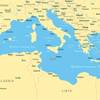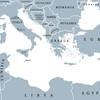A record number of migrants have reached Italy by boat from North Africa in 2016, according to official data, as pressure on Italy's shelter and asylum systems grows.
Italy has borne the brunt of new arrivals since the implementation in March of an agreement between the European Union and Turkey to curb the flow of migrants sailing for Greece.
As of Nov. 28, 171,299 boat migrants had reached Italy's shores, the Interior Ministry said, compared to the previous record of 170,100 for all of 2014.
There is no sign of a let-up in people crossing. Some 1,400 more migrants were rescued from rubber and wooden boats attempting to cross the central Mediterranean during Monday, Italy's coast guard said.
In the past three years, Italy has recorded nearly half a million migrant arrivals. Many have fled war, poverty or political oppression.
The influx has brought a record number of asylum requests this year in Italy where more than 176,000 asylum seekers now live in shelters. This is putting the country's asylum process and legal system under increasing pressure.
While there had been hope that a government formed in Tripoli in March would help stop people smuggling, it has not. Libya remains fertile ground for traffickers as local militias and a rival government in Tobruk compete for power.
Most of the migrants who have come to Italy this year are Africans of various nationalities. Some 36,000 Nigerians have made the trip, about 21 percent of the total, along with 20,000 Eritreans and more than 12,000 from Guinea.
An estimated 4,663 migrants have died in the Mediterranean this year as a record number of unaccompanied minors have come to Italy. As of the end of October, almost 23,000 unaccompanied minors -- mostly teenage boys -- had arrived, compared with 13,000 during the whole of 2014.
During the more stormy winter months, arrivals in the past have dropped, but rescuers are concerned this year that there will not be enough vessels to go to their aid.
(By Steve Scherer; Additional reporting by Reuters TV and Isla Binnie; editing by Ralph Boulton and Richard Lough)










